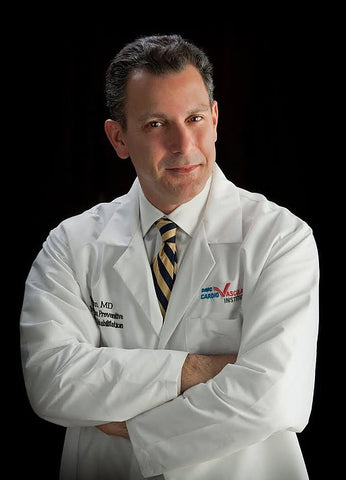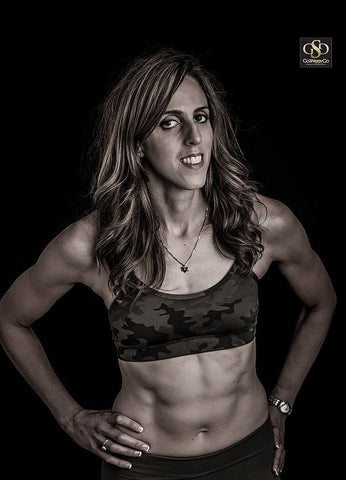
DR. JOEL KAHN
Dr. Joel Kahn has been practicing interventional and preventive cardiology since 1990. He began his journey as a doctor at the University of Michigan in Ann Arbor. He was accepted to a combined undergraduate and medical studies program on a 6-year plan. He graduated summa cum laude and number 1 in the school. He continued his education for 3 more years studying Internal Medicine and received top awards in resident research and clinical medicine. Dr. Kahn has over 100 scientific research publications and he recently published his first book, "The Whole Heart Solution" and "Dead Execs Don't Get Bonuses". Dr. Kahn has been a vegetarian for over 25 years and a vegan (whole foods plant-based) for over a dozen years. Not only does he teach his patients about the benefits of a plant-based lifestyle, he speaks about it all over the country.
Below Dr. Joel Kahn answered 10 questions about plant-based (vegan) diets that are commonly asked:
Why did you become a vegan/adopt a plant-based lifestyle?
I began my journey to vegan 30 years ago, first as a vegetarian as it was an easy way to adhere to Kosher dietary laws. With medical science showing vegan diets can reverse heart artery disease beginning in 1990, I made the transition to completely plant based at that time. Now I also consider animal kindness (ahimsa) and the environment as major reasons to continue the vegan movement.
Can one get enough protein on a vegan diet (whole foods plant-based diet)?
Yes, enough said. No issue. Eat broad and varied selections of the rainbow of fruits and vegetables, nuts, seeds, and whole grains and you never have to count the breakdown of fats, carbs and protein again.
Is one able to get enough calcium without dairy (milk, cheese, butter, and eggs)?
Calcium is a mineral from the ground, animals do not make calcium. Calcium is found in items that grow in the ground like all the wonderful vegetables that vegans enjoy. In fact, dairy and other animal proteins can increase the acidity of the body leading to urinary loss of calcium and harm bone strength.
Haven’t people been eating meat & dairy for centuries?Why should we stop eating meat & dairy now?
Veganism is a new option with the first vegan society founded in the 1940s. In reality, people in many cultures have been eating little meat, < 10% of calories, for centuries due to the easier availability and lower cost of garden grown plants. Current science and the food industry now make a completely plant based diet an easy and preferred option.
How is a vegan diet (whole foods plant based diet) healthier than others?
Research has shown that you can obtain all the nutrients you need for health with a broad and varied plant based diet and that, on average, vegans are thinner, have lower blood sugar, blood pressure, and blood cholesterol, suffer fewer heart attacks and strokes, and contract cancer less frequently than the general public. The longest lifespans on the planet are in those that eat little or no animal products.
Can you be an unhealthy vegan?
Most vegans start that way and I was one too. Whole food, plant based WFPB menus are the way to go, skipping highly processed textured vegetable protein and soy substitute meats. Candy, chips and other treats can be animal free but will not lead to optimal health.
What if I am in athlete, aren’t vegans scrawny and weak?
I am friends with some of the world's top ultra athletes like Rich Roll and Hillary Biscay and they set world records on WFPB diets. Some of the world's top body builders, like Derek Tresize, are plant based. The myth that meat is needed for strength is prevalent but completely false.
What is the difference between killing plants and killing animals?
Plants lack a brain, a heart, and a nervous system, which is found in animals. Plants also take a fraction of the land and water to raise. Plants don't bleed and scream on slaughter. If slaughterhouses had windows, we would all be vegetarians (Paul McCartney).
As a cardiologist, do you recommend a vegan diet to your patients?
I ask every patient to watch Forks Over Knives, read The China Study, and to study the research of Drs. Dean Ornish, Caldwell Esselstyn, Neal Barnard, and John McDougall. I want them to know that heart disease and diabetes reversal is a choice and starts with their fork.
What advice do you have for someone making a switch to a plant-diet?
Read books, visit websites, watch videos, and commit a minimum of 21 days to the plan. Some plans suggest first making breakfast vegan, then adding lunch and dinner over 3 weeks. Others jump right in with all meals vegan. Anyway you do it, if you have done your homework, developed a shopping list and food stores, and have few key recipes of WFPB meals, you cannot fail.
***Find more from Dr. Kahn at @drjkahn & www.drjoelkahn.com
Doctors are all around me. My dad is Chief of Nephrology at Kaiser Sunset, and most of my aunts and uncles are all doctors who graduated top of their class from Harvard and Yale Medical School. The difference between the doctors in my family and Dr. Kahn is that he takes nutrition into consideration with medicine. “Virtually every published study about physicians and nutrition counseling showed that primary care physicians…were not delivering nutrition services to their patients,” according to a scientific article published in the Nutrition in Clinal Practice (source). I had the honor and opportunity to get dinner with Dr. Kahn and his wife at 2 amazing vegan restaurants in LA (Gracias Madre & Crossroads Kitchen). Dr. Kahn is upbeat and fun. With such a youthful spirit - it must be all those plants he eats! Even though there are plenty of doctors in my life I could potentially work with, I asked Dr. Kahn to collaborate with me because he believes plant-based diets, exercise, and mind-body practices are key to optimal health.

DR. HEATHER SHENKMAN
Dr. Heather Shenkman is an interventional cardiologist practicing in the Los Angeles Area. She went to medical school at Albany Medical College, completed her internal medicine residency at Henry Ford Hospital, her cardiology fellowship at University of Rochester, and her interventional cardiology fellowship at Tufts Medical Center.
Dr. Shenkman has been vegan for several years (and vegetarian for longer). She is an devoted marathon runner and triathlete. Talk about a doctor who actually practices what they preach.
Below Dr. Heather Shenkman answered 10 questions about plant-based (vegan) diets that are commonly asked:
Why did you become a vegan/adopt a plant-based lifestyle?
Initially I chose a plant-based diet because I was so disturbed by the process of animals getting to our table. At that time, I was in my cardiology fellowship training, and I also saw how those foods led to the diseases that I treat, which reinforced my decision to follow a plant-based lifestyle.
Can one get enough protein on a vegan diet (whole foods plant-based diet)?
Protein is not a problem!!! The average American consumes far more protein than needed. I get my protein from beans, lentils, tofu, whole grains, nuts and seeds.
Is one able to get enough calcium without dairy (milk, cheese, butter, and eggs)?
There are many plant-based sources of calcium -- greens, soy, and beans all have calcium.
Haven’t people been eating meat & dairy for centuries? Why should we stop eating meat & dairy now?
People have been eating meat and dairy for centuries, but they certainly did not consume it in the quantities that we do.
How is a vegan diet (whole foods plant based diet) healthier than others?
Vegan plant-based diets are less processed, have more fruits and vegetables, and exclude animal products. They are associated with decreased risk of heart attack, stroke, diabetes, many kinds of cancers, kidney stones, arthritis, and obesity.
Can you be an unhealthy vegan?
There are lots of unhealthy vegan choices -- one could live on Pepsi, Oreo cookies, and Twizzlers, but that wouldn't be very healthy.
What if I am in athlete, aren’t vegans scrawny and weak?
I'm a triathlete, have completed races of all distances up to an Ironman triathlon, which included a 2.4 mile swim, 112 mile bike, and 26.2 mile run. I did that as a vegan. My vegan diet fuels me for strong performance and helps me recover faster than most other athletes.
As a cardiologist, do you recommend a vegan diet to your patients?
I encourage my patients toward whole-food plant-based vegan diets because they can help to reverse disease of the arteries. What advice do you have for someone making a switch to a plant-diet?
Take it one day at a time. Know that it takes about three weeks for the body to get used to any change in diet, and be patient.
***Find more from Dr. Shenkman at @veganheartdoc & www.veganheartdoc.com
Everytime I see the doctor, I'm asked how much I exercise (I do yoga at least twice a week). However, I find it ironic because many of these medical professionals questioning patients about exercise don't even engage in physical activites themselves. I really admire how athletic Dr. Shenkman is. Not only does she have time for interventional cardiology, she makes time to keep herself healthy, as we all should. Time is not an excuse.
